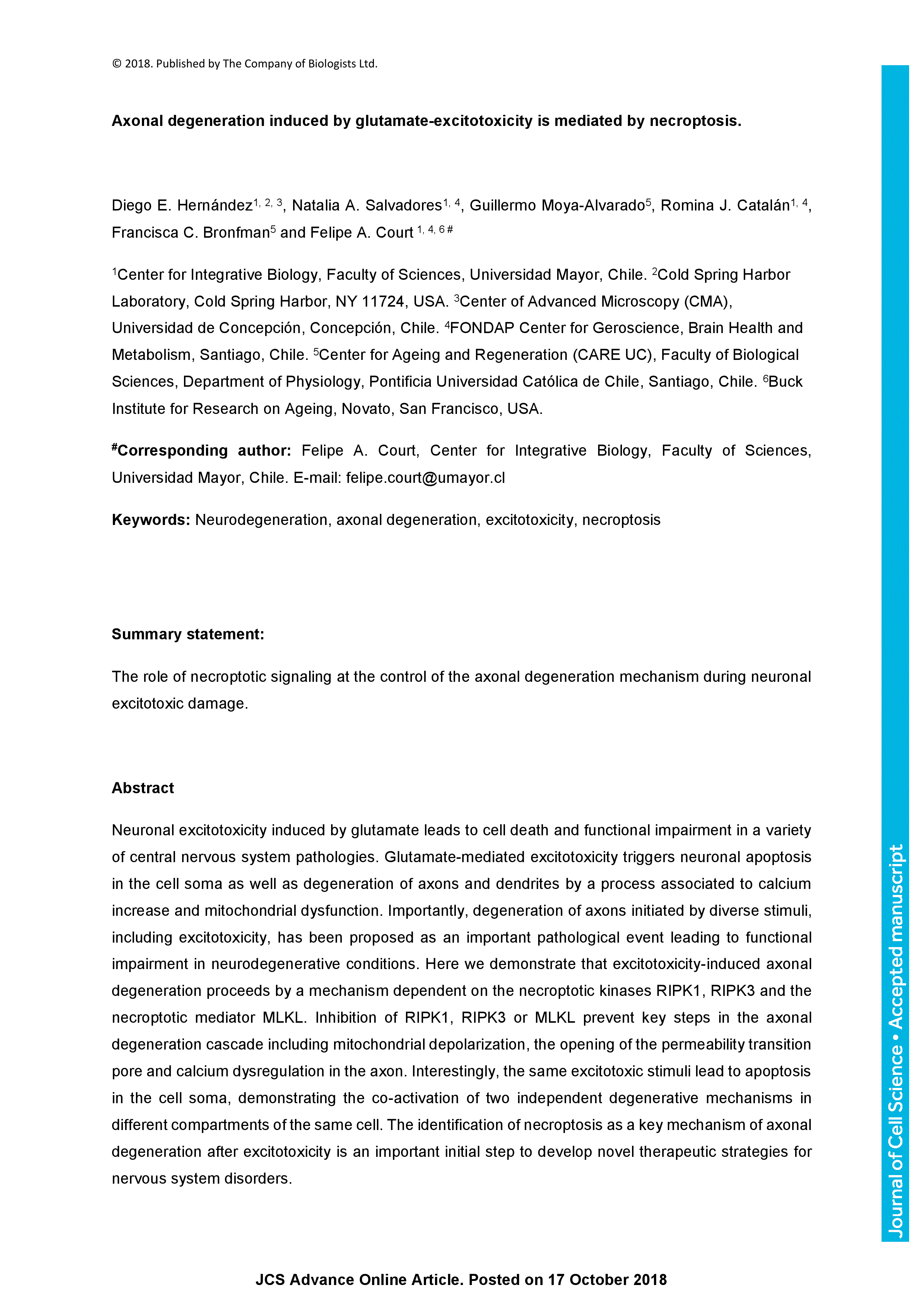Neuronal excitotoxicity induced by glutamate leads to cell death and functional impairment in a variety of central nervous system pathologies. Glutamate-mediated excitotoxicity triggers neuronal apoptosis in the cell soma as well as degeneration of axons and dendrites by a process associated to calcium increase and mitochondrial dysfunction. Importantly, degeneration of axons initiated by diverse stimuli, including excitotoxicity, has been proposed as an important pathological event leading to functional impairment in neurodegenerative conditions. Here we demonstrate that excitotoxicity-induced axonal degeneration proceeds by a mechanism dependent on the necroptotic kinases RIPK1, RIPK3 and the necroptotic mediator MLKL. Inhibition of RIPK1, RIPK3 or MLKL prevent key steps in the axonal degeneration cascade including mitochondrial depolarization, the opening of the permeability transition pore and calcium dysregulation in the axon. Interestingly, the same excitotoxic stimuli lead to apoptosis in the cell soma, demonstrating the co-activation of two independent degenerative mechanisms in different compartments of the same cell. The identification of necroptosis as a key mechanism of axonal degeneration after excitotoxicity is an important initial step to develop novel therapeutic strategies for nervous system disorders.
Axonal degeneration induced by glutamate-excitotoxicity is mediated by necroptosis
Currently Viewing Accepted Manuscript - Newer Version Available
Diego E. Hernández, Natalia A. Salvadores, Guillermo Moya-Alvarado, Romina J. Catalán, Francisca C. Bronfman, Felipe A. Court; Axonal degeneration induced by glutamate-excitotoxicity is mediated by necroptosis. J Cell Sci 2018; jcs.214684. doi: https://doi.org/10.1242/jcs.214684
Download citation file:
Advertisement
Introducing our new Editors

We welcome three new Editors to Journal of Cell Science - Robert Parton, Richa Rikhy and Simon Cook. You can read more about them in the Editorial from our Editor-in-Chief Michael Way.
2024 Journal Meeting 'Diversity and Evolution in Cell Biology'

Registration is open for our 2024 Journal Meeting Diversity and Evolution in Cell Biology, which aims to bring together evolutionary biologists and cell biologists investigating diverse aspects of cellular physiology. Final registration deadline: 3 May 2024.
Workshop: Physics of the Early Embryonic Cell Divisions

Early-career researchers interested in the roles of nuclear lipids, apply now for one of the ten funded places at this Workshop, which will take place 11-14 November 2024. Application deadline: 17 May.
Reasons to submit to Journal of Cell Science

There are many benefits to publishing in Journal of Cell Science - read more about why you should choose JCS or visit our submission page now.
Propose a new Workshop for 2026

We are now accepting proposals for our 2026 Workshops programme. We aim to be responsive to the community and open to novel initiatives, so if you have a new idea for a biological workshop that you feel would work well, please apply. Applications deadline: 19 July 2024.



